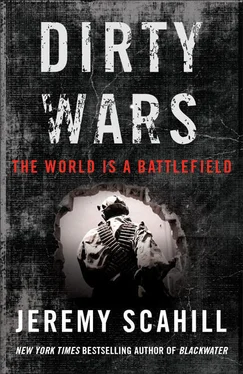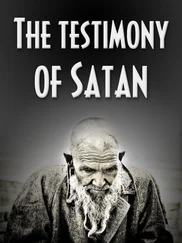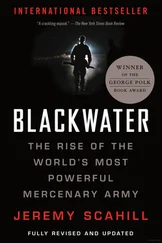Several former senior US intelligence, law enforcement and military officials who worked on Yemen operations and policy told me these prison releases were not accidental, and neither was AQAP’s choice of Yemen totally beyond Saleh’s control. While generally dismissing notions of direct collusion between Saleh and al Qaeda in planning attacks, the former officials described a multiyear pattern of Saleh’s tacitly allowing acts of terrorism to be conducted on Yemeni soil, or exploiting such attacks after they occurred, as a way of reminding Washington of the threat posed by al Qaeda in Yemen. “Saleh knows how to play the game in order for everyone to know he is needed—from al Qaeda to the Saudis to the US,” said the former top US counterterrorism official with extensive experience in Yemen. “And he plays it very well.”
The game was about getting the money and weapons and specialized training for Saleh’s most elite forces to battle the domestic rebellions he viewed as the real threat to his survival. “For years we have seen some of these regimes play these types of games,” said Dr. Emile Nakhleh, the former senior CIA intelligence officer, in 2010. “They play it for survival, they play it to stay on our good side, they play it to get all kinds of military aid—and, in fact, the military aid is two or three times more than the economic aid that Yemen gets….Therefore, if that’s true, then they are not necessarily serving [US] strategic, long-term counterterrorism policy.”
Some seasoned Yemeni political analysts, however, believed that there was actually direct cooperation between the Saleh regime and al Qaeda. There were allegations that some members of the elite Republican Guard, the Political Security Organization and the Central Security Forces—all of which received support from Washington—were working with al Qaeda cells or had helped them with supplies, safe houses and intelligence on foreign diplomatic installations. The 2006 prison break struck some well-connected Yemeni security experts as “an inside job,” asserted journalist Sam Kimball in a report for Foreign Policy. “The prison is an imposing fortress in the heart of Sana’a, with plainclothes soldiers patrolling its perimeter. Inmates’ spare cells—only plastic silverware is allowed in—are inspected several times a day. Prisoners are only allowed a half-hour a day outdoors.” Retired Yemeni colonel Muhsin Khosroof said, “We don’t know how they got the tools to dig a 300-meter tunnel, and we don’t know where the soil they dug out went.” Short of direct support from prison officials, he asserted, “this operation would seem impossible.”
The prison break would directly contribute to the growth of al Qaeda in Yemen. If what Colonel Khosroof and his colleagues alleged was true, it meant that the United States was backing the very government whose forces were facilitating al Qaeda’s resurrection in Yemen.
Following the prison break, the Bush administration continued to increase military assistance to Yemen. According to the former top US counterterrorism official, Saleh had calculated that the political costs of cracking down on al Qaeda in a meaningful way—by handing over its leaders—would have been too great. “The moment he surrenders key figures, [Saleh’s] gone off the cliff with al Qaeda. They won’t support him any more. It means the relationship would be severely shaken.” He added that Saleh “has given the US nothing of substance for the money he has received.”
In July 2006, five months after the prison break, the United States launched a major expansion of Camp Lemonnier in Djibouti, from eighty-eight acres to almost five hundred. Its force had grown to 1,500 personnel, and it served as a major hub for the CIA and a stopover point for Special Operations Forces conducting covert or clandestine actions in the region. “Some teams use the base when not working ‘downrange’ in countries such as Kenya, Ethiopia and Yemen,” reported Stars and Stripes, citing the camp’s executive officer, Colonel Joseph Moore.
While Saleh played his game with the United States over the escaped prisoners, the United States was gradually building up its presence in the region, although Bush administration officials continued to treat al Qaeda’s regrouping in Yemen as a secondary priority. In October 2007, Saleh received President Bush’s top aide on homeland security and counterterrorism, Frances Townsend, in Aden. During the meeting, Townsend asked Saleh for an update on Jamal al Badawi, the alleged mastermind of the Cole bombing. Saleh confirmed that he had been released and was “working on his farm” not far from where he and Townsend were meeting. Saleh added that he had just met with Badawi two weeks earlier. “Al-Badawi promised to give up terrorism and I told him that his actions damaged Yemen and its image; he began to understand,” Saleh said. When Townsend “expressed dismay” over Badawi’s release, Saleh told her not to worry because “he is under my microscope.” It was Saleh who, according to a US diplomatic cable sent after that meeting, brought up Wuhayshi and told Townsend point blank that he had taken over as the head of al Qaeda in Yemen. Townsend, according to the cable, responded by changing the subject to Yemen’s failed house-arrest system. Later in the meeting, Saleh discussed his fight against the southern secessionists, again portraying his survival as central to Washington’s policies. “It is important that Yemen not reach a state of instability,” he told Townsend. “We need your support.” Townsend replied, “You do not even have to think about it. Of course we support Yemen.”
Perhaps the most unusual moment during the Townsend-Saleh meeting came when Saleh brought in Faris Mana’a, a top Yemeni arms trafficker, and seated him next to Townsend. According to the United Nations, “Despite the Somalia UN arms embargo since 1992, Mana’a’s interest in trafficking arms into Somalia can be traced back at least to 2003,” and Mana’a “has directly or indirectly supplied, sold or transferred to Somalia arms or related material in violation of the arms embargo.” As Mana’a entered the room, he was given a chair at Townsend’s table. “Hey FBI,” Saleh said to one of the US officials, “if he does not behave properly, you can take him… back to Washington in Townsend’s plane or to Guantánamo.” Saleh told Townsend his forces had recently intercepted a shipment of weapons from Mana’a and given them to the Yemeni military. “He has donated weapons to the nation’s military—he can be considered a patriot now,” joked Townsend. Saleh laughed. “No, he is a double agent—he also gave weapons to the al-Houthi rebels.” A US diplomatic cable Townsend authorized following the meeting proclaimed: “You Can’t Make This Stuff Up.” Putting an exclamation point on the whole episode, two years later, Mana’a would go on to serve as coordinator of President Saleh’s “peace” efforts with the Houthi rebels.
Townsend’s interaction with Saleh—and those of other US officials—showcased Saleh’s prowess in playing multiple sides in his war to maintain power. “His use of the dual threats of terrorism and instability when referring to internal conflict is also not new,” asserted the US diplomatic cable cleared by Townsend after her visit. “Saleh consistently uses this tactic when attempting to garner USG [US government] support.” Saleh clearly used this approach because it was effective. When it came to al Qaeda, the less stable Saleh’s government appeared, the more money and training he could squeeze out of the United States. “All these US officials were in way over their heads in dealing with Saleh,” a former senior US military official who worked in Yemen told me. “When it comes to Yemen, he is so much smarter than them.”
Читать дальше












